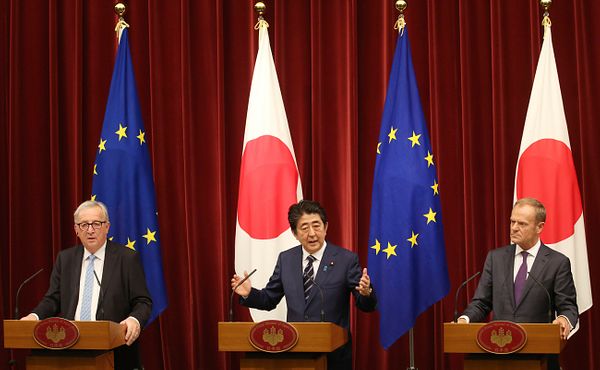[ad_1]
U.S. President Joe Biden said Thursday he sees a “very high” risk of a Russian invasion of Ukraine within the “next several days” as tensions continue to simmer over Russia’s massive buildup of troops near its neighboring country.
Meanwhile, in what Washington called an “escalatory step,” Russia has expelled the second-most senior official at the U.S. embassy in Moscow.
Russia’s action against U.S. Deputy Chief of Mission to Russia Bart Gorman was “unprovoked” and the U.S. government is considering its own response, according to a State Department spokesperson. Gorman departed last week.

U.S. President Joe Biden speaks at the White House in Washington on Feb. 15, 2022. (UPI/Kyodo)
The United States has been stepping up its criticism of Russia, with Biden administration officials saying Moscow’s recent claim of a partial troop withdrawal near Ukraine is “false” and that its expressed readiness to engage in diplomacy can be seen as a pretense.
More than 150,000 Russian troops have been arrayed along Ukraine’s borders, according to the State Department, with forces positioned within Russian territory as well as in Belarus, which has close ties with Moscow, and in Crimea, which was annexed from Ukraine by Russia in 2014.
Asked how high he believes the threat of invasion is, Biden told reporters, “It’s very high.”
“They have not moved any of their troops out. They’ve moved more troops in,” he said, adding, “Every indication we have is they’re prepared to go into Ukraine, attack Ukraine.”
But Biden also stressed that there is still a diplomatic path toward a solution, while saying he has no plans for phone talks with Russian President Vladimir Putin.
The two leaders spoke on the phone on Saturday but failed to make a breakthrough on the rising tensions over Ukraine.
The Kremlin accused Biden of stoking tensions by saying he expected Russia to invade Ukraine within days, Reuters reported.
Russia has been asserting that its security is under threat with NATO’s eastward expansion and the possibility of Ukraine’s membership in the alliance, although it has denied any intention to invade the former Soviet republic.
The United States has demanded Russia de-escalate by removing its troops from the border, while rejecting Moscow’s key demand to offer a security guarantee precluding Ukraine’s entry into the North Atlantic Treaty Organization.
But at the same time, Washington has suggested room for discussions with Russia to address their security concerns such as by setting reciprocal limits on military exercises in Europe and missile placement.
The United States and its allies have warned that any further Russian aggression against Ukraine, following its annexation of Crimea in 2014, would be met with severe costs including heavy economic sanctions from the West.
In a speech to the U.N. Security Council, Secretary of State Antony Blinken laid out in detail some possible ways Russia could manufacture a pretext for its attack and move ahead with military actions.
“This could be a violent event that Russia will blame on Ukraine, or an outrageous accusation that Russia will level against the Ukrainian government,” he said, adding it could also be a fabricated “terrorist” bombing inside Russia, a staged drone strike against civilians, or a fake attack using chemical weapons.
Once the attack begins, Russian missiles and bombs will drop across Ukraine, cyberattacks will shut down key Ukrainian institutions and Russian tanks and soldiers will advance on key targets which will likely include Ukraine’s capital, Kyiv, a city of 2.8 million people, the top U.S. diplomat said.
“If Russia doesn’t invade Ukraine, then we will be relieved that Russia changed course and proved our predictions wrong. That would be a far better outcome than the course we’re currently on,” Blinken said, urging Moscow to announce “today, with no qualification, equivocation, or deflection” that Russia will not invade Ukraine.
[ad_2]
Source link
















